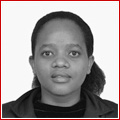African countries need to ensure that the health of refugees is protected during the COVID-19 pandemic
Posted: 21 June, 2021 Filed under: Omotunde Enigbokan | Tags: accessing healthcare, Africa, African Commission, coronavirus, COVID-19, gender-based violence, government, health care, health services, human rights, pandemic, refugees, status, UN, UNHCR, vaccination, women, World Health Organisation, World Refugee Day Leave a comment Author: Omotunde Enigbokan
Author: Omotunde Enigbokan
Centre for Human Rights, University of Pretoria
The protection of the right to health for refugees in Africa requires urgent attention, especially in this period when evidence shows that new variants of the coronavirus are spreading. As we celebrate World Refugee Day on 20 June 2021, and against the backdrop of the UNHCR’s theme ‘Together we heal, learn and shine’, it is pertinent that we interrogate how African countries are ensuring that the right to health for refugees, is guaranteed. This is particularly important with the development of COVID-19 vaccines worldwide, and in the onset of the administration of these vaccines in Africa.
Challenges faced by refugees in Africa
Existing research underlines the need for heightening refugees’ access to health facilities. Research further shows that refugees have been particularly hard hit by the COVID-19 pandemic in Africa. This situation is further compounded by the fact that many refugees live in overpopulated camps or reception centres, where they lack adequate access to health services, clean water and sanitation. This makes them more vulnerable to contracting COVID-19.
The Global Compact on Refugees: A breakthrough opportunity in addressing the protracted refugee crises in East Africa
Posted: 4 October, 2019 Filed under: Juliet Nyamao | Tags: Agenda for Sustainable Development, climate change, climate changes, East Africa, Ethiopia, flee, fleeing war, forced displacement, Global Compact on Refugees, human rights violations, humanitarian funding, Kenya, migration, New York Declaration for Refugees and Migrants, refugee camps, refugee self-reliance, refugees, SDG, sub-Saharan Africa, sustainable development, Uganda, UN, United Nations, war 2 Comments Author: Juliet Nyamao
Author: Juliet Nyamao
Human Rights Attorney, Kenyan Bar
In recent years, the world has witnessed an explosive increase in the number of refugees and internally displaced persons. The upsurge in forced displacement has increased the demand for humanitarian assistance and strained the limited resources of host nations, majority of which are developing economies. The resulting economic strain compelled the international community to develop sustainable mechanisms for protecting refugees and displaced persons in alignment with the 2030 Agenda for Sustainable Development. Read the rest of this entry »
The right to health for refugees in South Africa: Concrete reality or wishful thinking?
Posted: 13 December, 2017 Filed under: Cristiano d'Orsi | Tags: 2003 National Health Act, African Charter of Human and Peoples’ Rights, CEDAW, domestic law, health services, healthcare services, ICERD, ICESCR, National Strategic Health Plan, OHCHR, political rights, refugee convention, refugees, right to health, right to health care, SAHRC, socio-economic rights, South Africa, Universal Declaration of Human Rights, xenophobia 1 Comment Author: Cristiano d’Orsi
Author: Cristiano d’Orsi
Research Fellow and Lecturer at the South African Research Chair in International Law (SARCIL), University of Johannesburg
Scope of the study: How the ‘right to health’ is intended in this work
South Africa (SA) is one of the largest economies in Africa. Since December 2010 the country is a member of the informal association of five major emerging world economies (BRICS) and the only African country to be a member of the G20, the major international forum for economic cooperation and policymaking.
At the end of 2016, SA was reported to be hosting 91,043 refugees.
Although SA has ratified a good number of human rights legal instruments since the end of apartheid, in 1994, , the actual implementation of the rights enshrined in some of them still remain problematic. One such right is the right of refugees to have access to adequate healthcare in the country.
This situation occurs also because access healthcare services in SA, as with many other fundamental rights in the republic, has historically been biased in terms of a number of arbitrary grounds (p. 55).
Why has the EU’s Temporary Protection Directive not been applied during the migration crisis in order to receive Syrians and other asylum seekers?
Posted: 10 June, 2016 Filed under: Clara Burbano-Herrera | Tags: asylum, civil war, Council of the European Union, Directive on Temporary Protection, EU, EU states, European Asylum Support Office, European Commission, Europol, Frontex, immigration, irregular border crossings, Kosovo, Mediterranean, migrants, migration crisis, refugees, Syria, Turkey, UN Refugee Agency, UNHCR, war, Yugoslavia 1 Comment Author: Clara Burbano-Herrera
Author: Clara Burbano-Herrera
Fulbright Fellow, FXB Center for Health and Human Rights, Harvard University; Visiting researcher, Max Planck Institute for Comparative Public Law and International Law (Heidelberg); and FWO Postdoctoral Research Fellow, Human Rights Centre, Ghent University
The EU Border Agency Frontex indicates that a total of 1.83 million irregular border crossings were detected at the EU’s external borders in 2015, compared to 283 500 in 2014. According to the UN Refugee Agency (UNHCR), 1 015 078 people reached Europe irregularly in 2015 by crossing the Mediterranean, while a further 3 771 are believed to have drowned attempting the same journey. The main country of origin of applicants in EU+ countries (the 28 EU Member States as well as Norway and Switzerland) was Syria.
The idea of an African passport and the freedom of movement of persons in the continent: Only wishful thinking?
Posted: 22 February, 2016 Filed under: Cristiano d'Orsi | Tags: Africa, African Charter, African passport, African Union, asylum-seekers, AU Executive Council, Declaration on Migration, EAC, ECOWAS, federation, freedom of movement, ICCPR, ICRMW, IDP, International Convention on the Protection of the Rights of All Migrant Workers and Members of their Families, International Covenant on Civil and Political Rights, migration, Protocol on Facilitation of Movement of Persons, refugees, regional integration, SADC, territory, United States of Africa, USAf 4 Comments Author: Cristiano d’Orsi
Author: Cristiano d’Orsi
Post-Doctoral Researcher and Lecturer, Centre for Human Rights, Faculty of Law, University of Pretoria (South Africa)
“Hail! United States of Africa-free!
Hail! Motherland most bright, divinely fair!
State in perfect sisterhood united,
Born of truth; mighty thou shalt ever be.”
This is the incipit of the poem Hail, United States of Africa, composed in 1924 by M.M. Garvey, a famous Pan-Africanist leader.
This poem is considered to have initiated the concept of United States of Africa (USAf), a federation, extensible to all the fifty-four sovereign states, on the African continent.
In 2002, at the launch of the African Union (AU), President T. Mbeki, its first chairman, proclaimed that: “By forming the Union, the peoples of our continent have made the unequivocal statement that Africa must unite! We as Africans have a common and a shared destiny!”[1]
After that occasion, the concept of USAf has been highlighted in a more concrete way by other African leaders, such as A.O. Konaré in 2006,[2] M. Gaddafi in 2009 –the first to mention the possibility to issue a unique passport for the entire continent-[3] and, more recently, by R. Mugabe.[4]
The National Migration Policy and its implementation framework: A precursor for a more effective migration governance in Nigeria
Posted: 30 October, 2015 Filed under: Uche Hilary-Ogbonna | Tags: access to education, disapora, health, human trafficking, IDP, implementation framework, international migration, legal frameworks, Mediterranean, migrant smuggling, migrants, Migrants and IDPs, migration, National Commission for Refugees, National Migration Policy, Nigeria, policy, refugees, rural-urban migration flows Leave a commentHumanitarian Affairs Officer, United Nations Office for the Coordination of Humanitarian Affairs, (UN OCHA) Abuja
Legal frameworks are the bedrock for any effective management system. They underscore the importance of articulating a set of aspirations in concise directives and regulations, offering guidance to the myriad of field operatives and interventions in the varied sectors of migration management, development or the society at large. For the migration sector in Nigeria, it has been a long, tough journey to the adoption of the National Migration Policy and its implementation framework. The Policy is widely considered a breakthrough piece of legal document which came to fruition on account of years of toil by a host of government functionaries, development actors, the academia and civil society organizations.
The Policy comes at a very important time in the global migratory scene with the rise in international migration across the Mediterranean resulting in multiple deaths. With over 170 million citizens, Nigeria is important in migration management as a country of origin, transit and destination for migrants. Nigeria faces challenges such as effective diaspora engagement and remittances, inter-regional, rural-urban migration flows, migration of highly skilled and unskilled labour, data generation, as well as trafficking in persons to mention a few.
Respecting the rights of urban refugees in East Africa through a human rights approach to urbanisation
Posted: 7 September, 2015 Filed under: Gertrude Mafoa Quan, Michael Addaney | Tags: 1951 Convention, assault, Burundi, Democratic Republic of Congo (DRC), discrimination, East Africa, Eritrea, Ethiopia, hostility, human rights, Kenya, nited Nations High Commissioner for Refugees, poverty, Refugee Consortium of Kenya, refugees, Rwanda, Somalia, South Sudan, Sudan, sustainable development, Tanzania, Uganda, UN Habit, UNHCR, United Nations Convention relating to the Status of Refugees, urban development, urban refugees, urbanisation 3 Comments Author: Michael Addaney
Author: Michael Addaney
Student (MPhil Human Rights and Democratisation in Africa), Centre for Human Rights, Faculty of Law, University of Pretoria
 Author: Gertrude Mafoa Quan
Author: Gertrude Mafoa Quan
Candidate Attorney; LLM (Multidisciplinary Human Rights) student at the Centre for Human Rights, University of Pretoria
The city is the new refugee camp…
~ International Rescue Committee
Article 1 of the 1951 United Nations (UN) Convention relating to the Status of Refugees (1951 Convention) defines refugee as ‘a person who is outside his or her country of nationality or habitual residence due to a well-founded fear of persecution base on race, religion, nationality, membership of a particular social group or political opinion and is unable or unwilling to avail him or herself of the protection of that country or to return there for fear of persecution’. Due to contextual issues, article 1 of the 1969 Organisation for African Unity’s Convention Governing the Specific Aspects of Refugee Problems in Africa (1969 OAU Convention) added a second paragraph to the 1951 Convention to incorporate people that have been displaced due to liberation wars and internal upheavals.
Meanwhile, there is no internationally recognised definition for urban refugees. However, the Refugee Consortium of Kenya (RCK) defines an urban refugee as a refugee who satisfies the international requirements for obtaining a refugee status and has self-settled in a city or town. Recent decades have experienced rapid population growth with most cities witnessing urban sprawl. The United Nations High Commissioner for Refugees (UNHCR) reported in 2009 that an estimated 58 percent of the world’s 10.5 million refugees now reside in cities.
Despite it being mostly rural region, UN Habit has projected that Sub-Saharan Africa and for that matter countries in Eastern Africa will have more than half of its population residing in urban areas by 2026. Characteristically, there has been increasing flow of refugees to urban areas in this region too. According to official UNHCR 2015 statistics, four Eastern African countries (Kenya, Uganda, Tanzania and Ethiopia) host more than 1.5 million refugees. These refugees are mostly from 9 countries (Somalia, South Sudan, Sudan, Uganda, Ethiopia, Eritrea, Rwanda, Burundi and DR Congo).

 Author: Garang Yach James
Author: Garang Yach James Author: Joseph Geng Akech
Author: Joseph Geng Akech
Right to participate and citizenship: Liberians yearn for an inclusive vote in 2023
Posted: 6 January, 2023 | Author: AfricLaw | Filed under: Uncategorized, Urias Teh Pour | Tags: 2023, African Charter on Democracy, African Commission on Human and Peoples' Rights, Alien and Nationality Act of 1973, citizenship, civil war, Elections and Good Governance, Gabriel Shumba and Others, General Comment 25, human rights, Human Rights Committee, inclusive vote, Liberia, migrant workers, Mtikila v Tanzania, New Elections Law, refugees, Right to participate, right to vote, Vienna Convention on the Law of Treaties | 1 CommentExecutive Director, Independent National Commission on Human Rights (INCHR), Liberia
For the first time in the political history of Liberia, Liberians in the diaspora are making a strong case for their inclusion in the 2023 general and presidential elections. This call has come at the time when the Alien and Nationality Act of 1973 which prohibited dual nationality has been amended. The amended Act, Alien Nationality Law of 2022, provides that ‘any person who acquires another in addition to his or her Liberian citizenship shall not [be] deemed to have relinquished his or her Liberian citizenship.’
The passage of this law led to a wave of calls for the democratisation of electoral politics, considering the huge population of Liberians living abroad and their aspiration to participate in elections to elect their leaders at home. The Liberia Demographic Survey of 2021 projected Liberia’s population at 5.18 million. There are approximately 1.2 million Liberians and people with Liberian heritage scattered all over the globe, with the majority living and referring to the United States as their home. Some statisticians have predicted that the on-going population and housing census would exceed the projected number.
Read the rest of this entry »